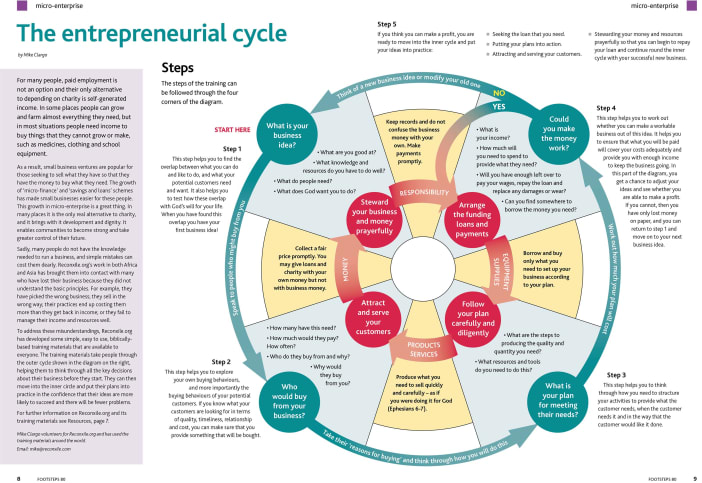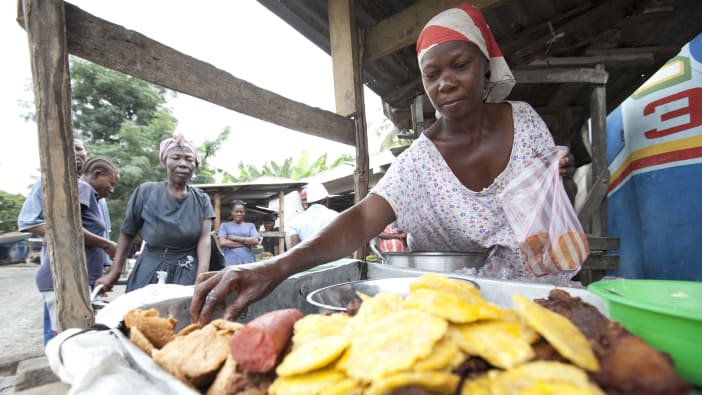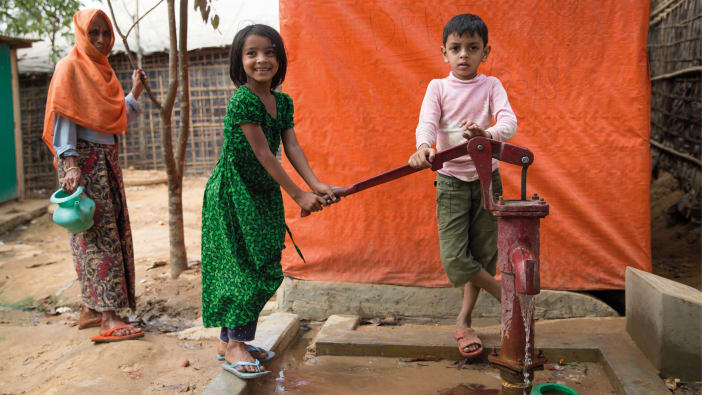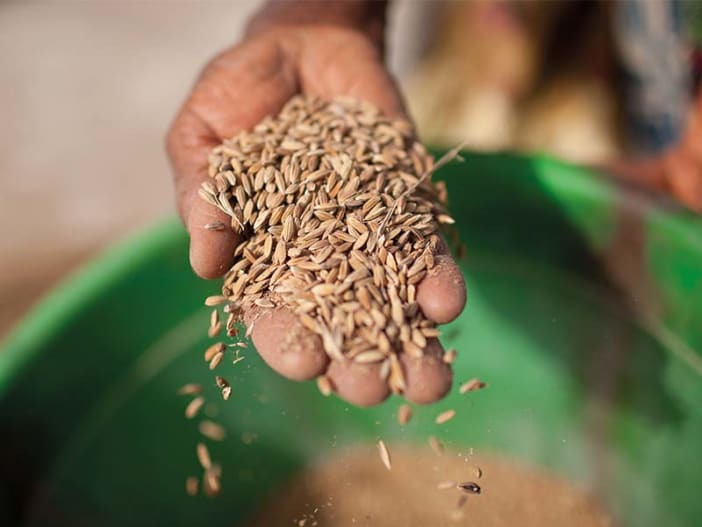Businesses are important in improving economic and technical development, and creating wealth and jobs. They play a central role in poverty reduction. But, how do people without access to funds, training and resources break into the highly competitive world of business? Micro-enterprise (also known as small business) enables people to generate an income by starting and growing their own small business. Many of the businesses start as part-time or homebased businesses and, in time, they can provide jobs for other people within the community.
As entrepreneurs, women not only make a huge contribution to national income, but also create reliable social safety nets for their families and communities. This is because women often invest their income in healthcare, education and housing for their families.
Owning a business can build an individual’s confidence, dignity and self-esteem. When successful, it also enables people to earn their own income.
What is micro-enterprise development?
Micro-enterprise development is the process of providing services such as training and technical assistance to potential and experienced small business owners. Micro-enterprise development reduces the risk associated with running a business and increases the entrepreneur’s chance of success.
Micro-enterprise development programmes can help small businesses grow by providing business advisers, mentoring and coaching, and access to technology and markets. Training in business skills can be provided in addition to technical skills appropriate for the enterprise involved. In addition to training and technical assistance, funds can be made available to help with start-up or expansion of a small business. This is known as micro-finance or micro-credit.
Who provides microenterprise services?
Most people set up a business with an idea based on a skill or a product. New business owners can get into difficulties if they do not have basic business knowledge. Very few entrepreneurs have the background and experience to operate a business, particularly as there can be complicated regulations.
Micro-enterprise development programmes and services are usually provided by NGOs (non-govern mental organis ations), and can be funded through partnerships with government agencies, foundations, private industry and individuals.
Setting up a small business
There are many things to consider when setting up a small business, including practical steps, challenges and results.
Before making products to sell or providing services, it is important to consider the market place. Attention should be paid to feasibility, product quality, cost and marketability. The decision to create or develop a business should be made in consideration of the existing and potential markets. Market research is very important, as you need to know what your customers want.
Time must also be allocated to business planning. As a salesperson you need to know what you want to achieve and how you will achieve it. This includes predicting how much you will sell and how you will encourage people to buy your goods or service. The entrepreneurial cycle on pages 8–9 can help you to think through these steps.
PRACTICAL STEPS
- Identify a business idea.
- Collect information about it – assess the needs of the customers and the availability of resources.
- Work out your potential income and expenditure.
- Attend training and workshops if required.
- Understand health and safety and its relevance to your business.
- Set up clear and reliable documentation systems.
SOME OF THE CHALLENGES
- A fear of taking risks.
- Insufficient income.
- Networking problems. For example, the supply of raw materials.
- Insufficient management and marketing skills.
- Low levels of motivation and courage.
SOME OF THE RESULTS
- Increased income.
- Greater control of lives and circumstances.
- Increased dignity and self-esteem.
- Improved quality of life, such as education, healthcare and home improvements.
However, success in business can lead to decreased time with family and tensions can arise. It is important to realise that the reason for micro-enterprise is to improve quality of life, not just wealth generation.
Compiled by Stephen Thomas and Rebecca Dennis. Stephen is the Trading Overseas Business Manager for Tearcraft. http://www.tearcraft.org/
CRUNCHY PEANUT BARS – a practical idea for a small business
Ingredients:
- 1kg (4 cups) roasted peanuts
- 1kg (4 cups) water
- 2kg (8 cups) brown sugar (use white if brown is not available)
Shell and roast the peanuts until lightly brown. (Cashew and other similar nuts could also be used.) Grind them coarsely.
Dissolve the sugar in the water and heat until it begins to thicken. Add the peanuts and stir constantly to prevent burning. Test regularly for setting by dropping small amounts into cold water in a cup. When they form hard balls remove from heat and pour either into a shallow tin or onto a greased board. Roll to a sheet 1⁄2cm thick and cut into small bars before it cools and sets. (You’ll need a hammer once it has set!) Wrap with cellophane or wax paper.
NOTE Getting the setting point right is very important. There are only a few minutes between soft balls (which will not set), hard balls and a pan of burnt sugar! Experiment first with smaller quantities.
WARNING Boiling sugar is very dangerous - keep children away.
Asha Handicrafts
Asha Handicrafts as an example of micro-enterprise
Asha Handicrafts is helping women artisans realise their economic potential and proving that they have the capacity to build their own micro-enterprise units. Through economic development initiatives, vocational training and credit facilitation, many women artisans are now self-employed. As a result, they have enough money to feed their children and send them to school. This approach is very powerful in lifting communities from economic poverty, and enabling the community to be self-reliant and live with dignity.
(Allan Almeida, Asha Handicrafts, Mumbai)
Asha Handicrafts comments on micro-enterprise in India
Micro-enterprise plays a critical role in the development of any economy, but particularly in those economies that are transitioning from traditional subsistence to a modern industrial economy. In India, the micro-enterprise sector has a long tradition and, since independence, has contributed significantly to the overall economic development of the country. The microenterprise sector will continue to play a significant role in ending poverty and promoting higher levels of employment. Self-employment through micro enterprise can play a considerable role in reducing poverty for millions of people in countries like India.
Nearly 40 per cent of India’s population lives in poverty. Many people are poor because they lack regular income. To add to their difficult lives, over 90 per cent of the rural poor are deep in debt. Unable and unwilling to access banks or to apply for loans, poor people turn to local moneylenders, who charge 60 to 120 per cent interest (per year) or even more, trapping themselves in extreme poverty.
With almost 80 per cent of the Indian population fighting for survival everyday, it is important to identify new ways and means to provide resources they need to better their lives. One way of dealing with the situation is to create sustainable livelihoods. Microenterprise leads to sustainable livelihoods.










